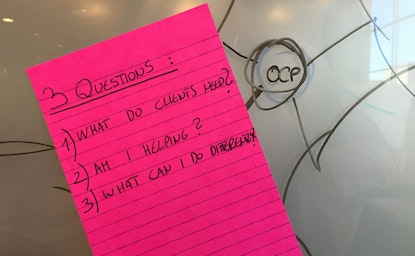A new morning routine to make procurement more responsive

Imagine that all procurement officers – whether at a procurement office in a major OECD city, a procurement agency in a developing country, or at a multilateral development bank – asked themselves the following questions when they sit down at their desks every morning:
- What do my clients need from this contract?
- Am I and our procedures helping them?
- What can I do differently to serve my clients needs?
My bet is that it would transform contracting. Procurement is often perceived as tedious, slow and overly bureaucratic. Or worse, as opaque and plagued by mismanagement and corruption. Despite, or maybe because of, its purpose (delivering goods and services to customers) and scope (trillions of dollars each year), procurement is surprisingly often treated as a compliance mechanism rather than as the problem-solving power that it could be!
There are many reasons why contracting is often a cumbersome process that does not fully deliver on its promises: overregulation, old technology systems and conservative attitudes, to name just a few. But, after attending the Feedback Summit 2016 this month, I am convinced that one of the key obstacles is the lack of feedback loops in procurement. The ultimate beneficiaries of procurement, customers and citizens, are all too often forgotten in the contracting process. They are not treated as clients who know best what they need and whom the contracting process should ultimately most serve. If citizens and customers don’t have a choice and voice in the procurement process, if they are not treated like clients, contracts will never be able to deliver the best solutions.
That’s why we at the Open Contracting Partnership strongly believe in engagement and feedback. Both are must-haves for any government agency or company that fully wants to open up contracting. Disclosure and data are the first steps, but only with feedback loops will irregularities in deals, or service problems, be resolved. We are not the only ones who are trying to make procurement more responsive and solution oriented. Citymart, for examples, helps cities such as New York City solve procurement problems. Integrity Action trained more than 6000 monitors in 2014, who monitored about 1,500 projects, including the implementation of contracts for roads, schools and clinics (the estimated value of projects monitored is approximately $372m) . The monitors were able to resolve 73 percent of the problems that they identified – leading to safe schools, improved roads, and better-managed water and sanitation projects.
The other key takeaway that I had from the Feedback Summit 2016 is that we have to start with our own organizations – we cannot expect our clients to invite feedback and act on it if we do not do the same ourselves. At the Open Contracting Partnership we already put a lot of emphasis on co-designing our projects with our in-country partners, but we can definitely do better on asking for feedback on how we are serving them.
The summit sparked a lot of ideas that we will explore further over the coming months, such as including sections on what has not worked in our projects in our first annual report; making our own contracts, grants and finances open and collecting client feedback for our Open Contracting Data Standard help desk.
Finally, after the Feedback Summit I won’t only expect procurement officers and my organization to ask for feedback; I will make it my own morning routine to ask myself every day:
- What do my partners and clients need?
- Am I helping them?
- What could I do differently?
The sticky note to remind me of my routine is already hanging on my desk….